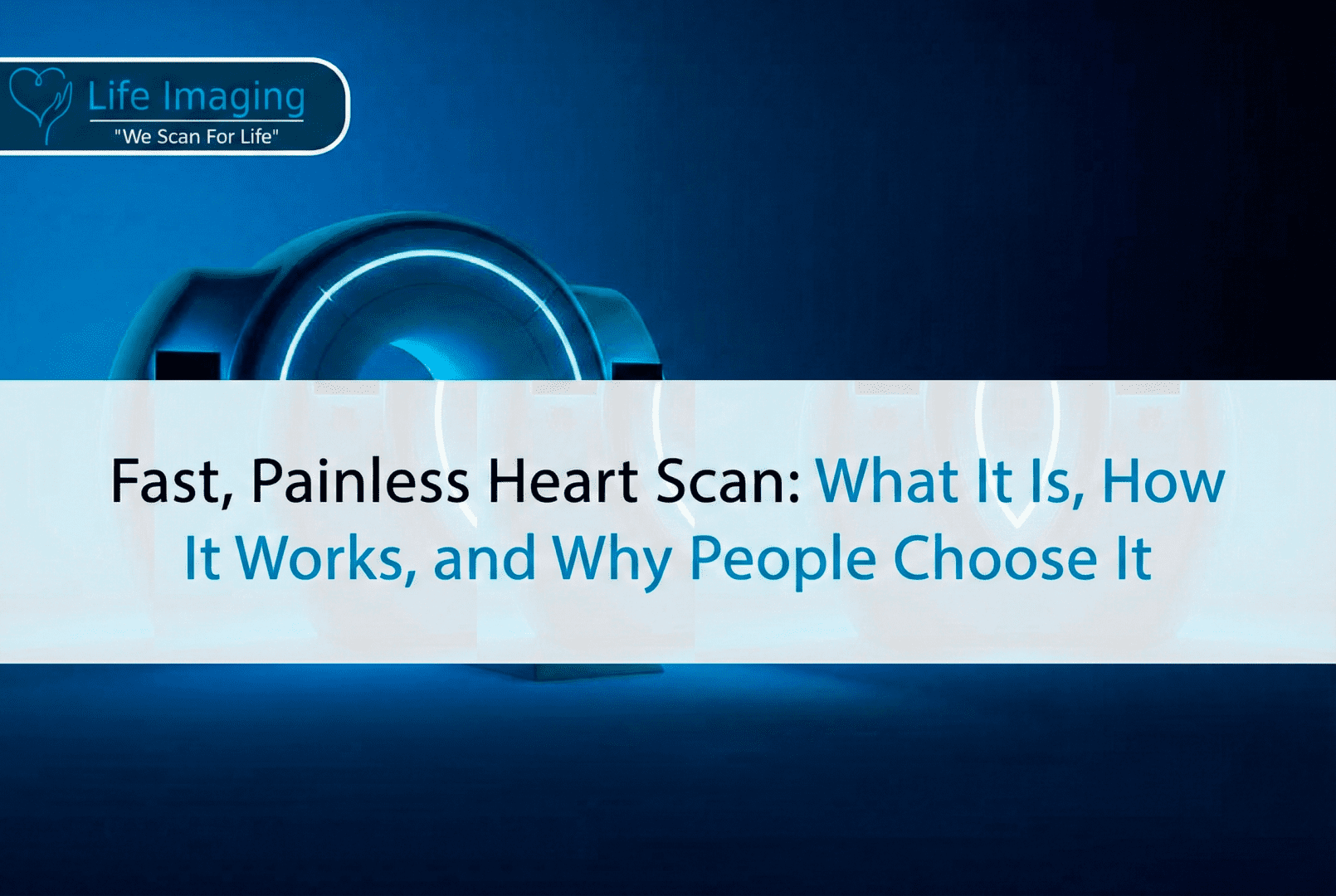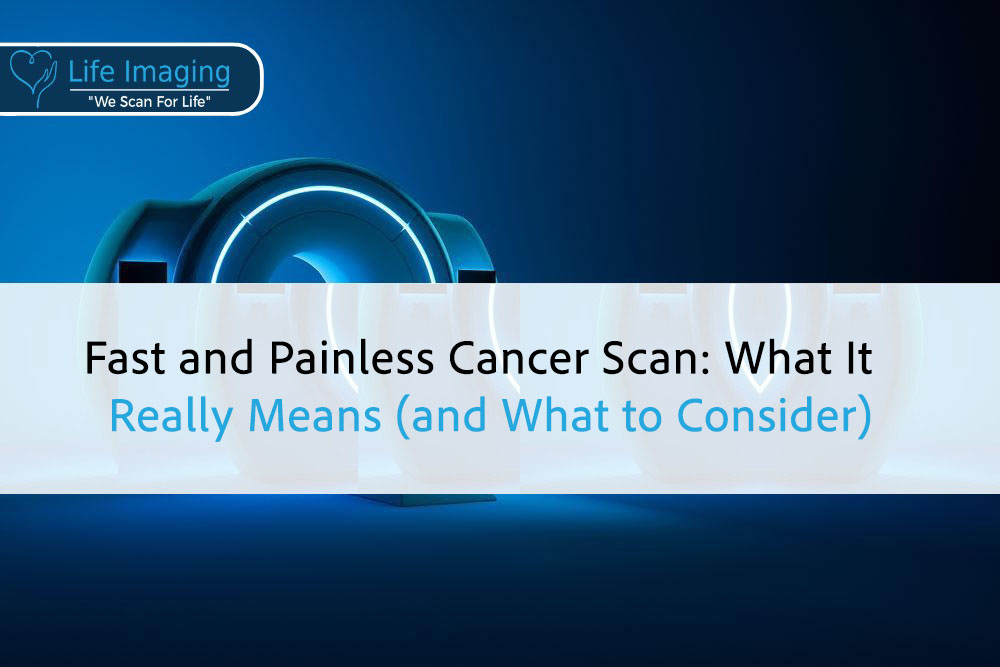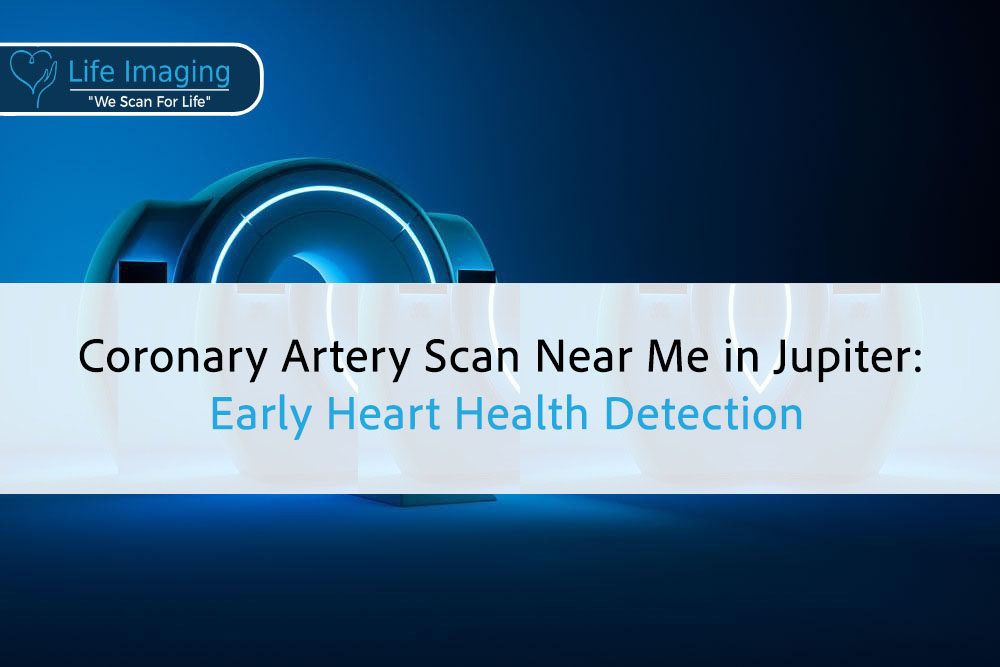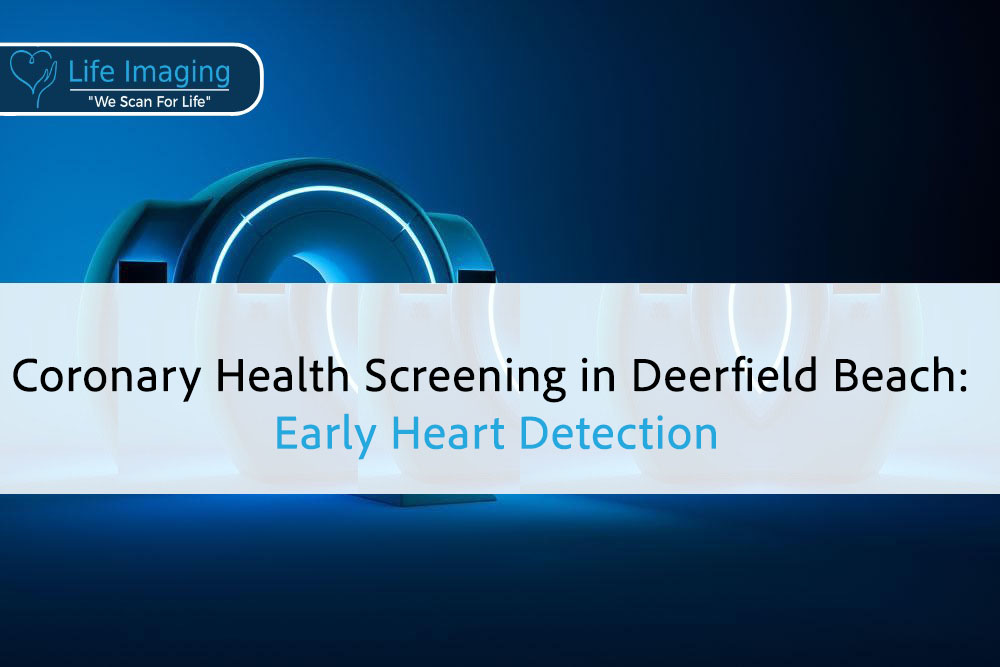
Coronary Artery Scan: What It Shows and Why It Matters for Prevention
Coronary Artery Scan: What It Shows, Who Needs It, and

Summer is a time of fun and relaxation, but it can also be an important period to prioritize your health. As temperatures rise, preparing for medical procedures and screenings, such as heart scans, requires some additional considerations. Life Imaging Fla, an esteemed imaging center dedicated to the early detection of heart disease and cancer, understands the importance of accurate and timely health assessments. Heart scans are crucial diagnostic tools that help detect early signs of heart disease, potentially saving lives through early intervention.
Preparing for a heart scan in the summer includes a few unique steps to ensure the most accurate results and a stress-free experience. Factors like hydration, clothing choices, and managing the heat are vital to consider. Additionally, understanding the procedure and what to expect can help alleviate any anxiety and allow for a smoother process.
Life Imaging Fla offers advanced imaging technologies and expert care, making it a trusted choice for your heart health needs. This article will guide you through the essential steps to prepare for a heart scan during the summer months. We will cover practical tips for staying comfortable, maintaining proper hydration, and managing heat, all while ensuring a successful and efficient scan. By following these guidelines, you can focus on your health without letting the summer heat become a hindrance.
Whether you are scheduling your first heart scan or are a returning patient, these insights will help you make the most of your appointment at Life Imaging Fla. Taking the appropriate steps to prepare not only ensures a more pleasant experience but also enhances the accuracy and effectiveness of your heart scan. Let’s dive into what you need to know to be well-prepared for your heart scan this summer.
Hydration is a crucial factor in preparing for a heart scan, especially during the hot summer months. Staying properly hydrated helps ensure that your blood volume remains stable, which can affect the results of your scan.
Dehydration can cause the heart to work harder, leading to inaccurate readings. Proper hydration ensures that your body functions optimally, providing clearer and more accurate images during your heart scan.
– Drink Plenty of Water: Aim for at least eight glasses of water a day. Increase this amount if you’re spending time outdoors or engaging in physical activities.
– Avoid Caffeine and Alcohol: These substances can dehydrate you. Opt for water or herbal teas instead.
– Monitor Urine Color: Light yellow urine indicates good hydration levels. Darker urine suggests you need to drink more water.
– Eat Water-Rich Foods: Foods like cucumbers, watermelon, and oranges can contribute to your daily water intake.
What you wear can also impact your comfort and ease during a heart scan. In summer, lightweight and breathable clothing is essential to stay cool.
Tight or heavy clothing can make you feel hot and uncomfortable, which might increase your heart rate. Loose, breathable clothing helps you stay cool and relaxed, leading to more accurate scan results.
– Wear Light Fabrics: Choose cotton or moisture-wicking materials that help keep you cool.
– Opt for Loose-Fitting Clothes: Looser garments allow better air circulation around your body.
– Dress in Layers: If the imaging center tends to be chilly, wearing layers allows you to adjust your clothing to stay comfortable.
– Consider Open-Toed Footwear: Flip-flops or sandals can help you stay cooler compared to closed shoes.
Heat can have significant effects on your body’s state and, consequently, the results of your heart scan. It’s important to take measures to keep your body temperature regulated when temperatures soar.
Extreme heat can lead to dehydration, increased heart rate, and overall discomfort, which may affect the accuracy of your scan. Managing your exposure to heat helps in maintaining a stable condition for the test.
– Stay Indoors During Peak Heat: Avoid being outside during the hottest parts of the day, usually between 10 AM and 4 PM.
– Use Fans and Air Conditioning: Keep your living and workspaces cool to avoid overheating.
– Take Cool Showers: A quick cool shower can lower your body temperature effectively.
– Wear a Hat and Sunglasses: If you must go outside, these items can help protect you from the sun’s rays.
Preparing mentally and physically for your heart scan can also make a significant difference. Feeling calm and well-prepared not only helps you stay relaxed but can also contribute to more accurate results.
Being stressed or anxious can cause your heart rate and blood pressure to rise, potentially affecting the scan results. Preparing mentally and physically helps in staying calm during the procedure.
Tips for Mental and Physical Preparation
– Get Plenty of Sleep: Aim for at least 7-8 hours of sleep the night before your scan to ensure you’re well-rested.
– Practice Relaxation Techniques: Techniques such as deep breathing, meditation, or gentle yoga can help you stay calm.
– Eat a Balanced Meal: Have a light meal a couple of hours before your appointment to avoid feeling faint or light-headed.
– Arrive Early: Arriving a bit early can help you avoid rushing, giving you time to relax before the scan.
Knowing what to expect during the heart scan can significantly reduce any anxiety you may have. Familiarizing yourself with the process helps you feel more at ease.
– Check-In Process: Upon arrival, you’ll check in and fill out any necessary paperwork.
– Preparation: You may be asked to change into a hospital gown, depending on the type of scan.
– The Scan: You’ll lie down on a table that slides into the imaging machine. The procedure is painless and usually takes about 30 minutes to an hour.
– After the Scan: Once the scan is complete, you can usually resume your normal activities right away.
By following these steps, you can ensure a successful and comfortable heart scan during the summer months. Staying prepared and informed helps you focus on your health without the challenges of the season getting in the way.
What you eat and drink before your heart scan can affect the results. In summer, lighter meals and avoiding certain types of drinks can improve scan accuracy.
Heavy meals and sugary drinks can affect your metabolism and heart rate. Consuming these before your heart scan can lead to readings that don’t accurately reflect your normal heart function.
– Opt for Light Meals: Stick to salads, lean proteins, and fruits a few hours before your scan.
– Avoid Sugary Drinks: Sugary sodas and juices can spike your blood sugar, which may impact your scan results.
– Limit Caffeine Intake: While caffeine is usually okay in moderation, it’s best to avoid it right before your heart scan. Caffeine can cause temporary increases in heart rate and blood pressure.
– Stay Hydrated with Water: Water is the best choice for hydration. It keeps you refreshed without unnecessary calories or sugar.
The time of your appointment can impact your comfort and the scan’s accuracy, especially during the hot summer months. Choosing the right time can make a big difference.
Earlier in the day, temperatures are usually cooler, and your body is more likely to be well-rested and hydrated. This can lead to more accurate scan results and a more comfortable experience.
– Schedule Morning Appointments: Aim for a morning time slot, ideally before 10 AM. The cooler temperatures and your well-rested state can optimize your scan experience.
– Avoid Peak Heat Hours: Try to avoid scheduling your scan during the afternoon when temperatures are at their highest.
– Plan Ahead: If your imaging center allows, book your appointment well in advance to secure a preferred time slot that suits your schedule.
Communication with your healthcare provider is crucial when preparing for a heart scan. Being open about your health and any concerns ensures you get the best care.
Discussing your health status, medications, and any concerns with your doctor can help tailor the scan to your specific needs. This can lead to more accurate and relevant results.
– Discuss Your Medications: Inform your doctor about any medications you are taking. Some medications can affect your heart rate and should be noted before the scan.
– Share Your Concerns: If you have any worries or questions about the scan, don’t hesitate to ask. Understanding the procedure can help ease anxiety.
– Provide Health Updates: Mention any new symptoms or changes in your health since your last visit. This information is important for accurate assessment.
– Follow Pre-Scan Instructions: Your doctor may give you specific instructions to follow before your scan. Be sure to adhere to these for the best results.
Regular heart scans are an essential part of monitoring heart health, especially as we age or if we have risk factors for heart disease. Understanding the benefits can motivate you to prioritize these important screenings.
Heart scans can detect problems early, sometimes before symptoms even appear. Early detection allows for prompt treatment, improving health outcomes and potentially saving lives.
– Early Detection: Identifying heart disease at an early stage allows for more effective treatment interventions.
– Monitoring Progress: For those already diagnosed with heart conditions, regular scans help track the efficacy of treatments and lifestyle changes.
– Peace of Mind: Knowing the state of your heart health can provide reassurance and peace of mind.
– Customized Care: Regular scans enable healthcare providers to offer personalized advice and treatment plans based on up-to-date information.
On the day of your heart scan, following some simple steps can ensure a smooth and effective process. Proper preparation makes a significant difference in the quality of the scan and your overall experience.
Being well-prepared helps reduce stress and ensures that the scan goes smoothly. This results in clearer images and more accurate readings of your heart health.
– Arrive Early: Aim to arrive at least 15 minutes before your scheduled appointment time. This allows for any necessary paperwork and gives you time to settle in.
– Wear Comfortable Clothing: Choose clothing that is easy to remove if you need to change into a gown.
– Bring Your Medical Records: Having your medical records on hand allows the imaging staff to review your health history and provides context for your scan.
– Stay Calm: Practice deep breathing or other relaxation techniques to stay calm and minimize anxiety.
– Follow Any Specific Instructions: Your doctor may have provided specific instructions related to diet, medications, or other preparatory steps. Adhering to these ensures the best possible outcome.
After completing your heart scan, there are a few considerations to keep in mind. These help you understand the next steps and maintain your heart health.
Understanding what to expect after your scan helps manage your expectations and clarifies any follow-up actions you may need to take.
– Discuss Results Timeline: Ask your doctor when you can expect to receive your scan results. Knowing the timeline helps you stay informed.
– Review Results with Your Doctor: Schedule a follow-up appointment to discuss the results in detail. Your doctor can explain what the findings mean and recommend any necessary actions.
– Relax and Hydrate: After your scan, it’s important to relax and stay hydrated, especially if you were instructed to fast or avoid certain substances beforehand.
– Follow Any Additional Instructions: Your healthcare provider may give you specific post-scan instructions. Be sure to follow these for optimal care.
Following these guidelines can help ensure that your heart scan during the summer is as accurate and comfortable as possible. By taking the time to prepare properly, you contribute to the success of the procedure and your overall heart health.
Understanding the symptoms that might indicate the need for a heart scan is crucial, especially during the summer when many are active. Sudden health changes should not be ignored.
Identifying warning signs early can lead to timely scans and necessary treatment. This vigilance can significantly affect overall heart health outcomes.
– Chest Pain: Any form of chest discomfort, especially if it’s new or more intense, should be promptly checked.
– Shortness of Breath: Difficulty in breathing might signal a heart issue, particularly during physical activity.
– Fatigue: Unusual tiredness that doesn’t improve with rest can be an early sign of heart problems.
– Swelling: Swelling in legs, ankles, or feet could indicate heart issues.
– Dizziness or Fainting: Feeling light-headed or fainting spells are warning signs that need immediate attention.
Living a healthy lifestyle can improve the success of your heart scan and overall heart health. Healthy habits play a significant role in maintaining a well-functioning heart.
Incorporating healthy practices can reduce the chances of heart disease and improve the accuracy of heart scans by stabilizing heart function.
– Balanced Diet: Eat plenty of fruits, vegetables, whole grains, and lean proteins. Avoid excessive salt, sugars, and processed foods.
– Regular Exercise: Engage in at least 30 minutes of moderate exercise most days of the week. Activities like walking, swimming, or cycling can be very effective.
– Quit Smoking: Smoking is a major risk factor for heart disease. Seeking support to quit can greatly benefit your heart.
– Manage Stress: High stress levels can affect heart health. Practices like meditation, deep breathing, and adequate sleep can help manage stress.
– Regular Check-ups: Regular visits to your healthcare provider ensure ongoing monitoring of your heart health.
Different heart scans provide various types of information about your heart’s condition. Knowing which scans are available can help you understand what to expect.
Why Understanding Scan Types is Important
Each type of heart scan offers unique insights into heart health, from detecting blockages to assessing overall function.
– Electrocardiogram (ECG or EKG): Measures the electrical activity of the heart. It’s quick and painless.
– Echocardiogram: Uses ultrasound to visualize heart structure and function, providing detailed images.
– Stress Test: Assesses heart function under physical stress, often involving treadmill exercise.
– Cardiac CT Scan: Uses X-rays to create detailed images of the heart, often used to detect blockages.
– MRI Scan: Uses magnetic fields to produce detailed images, useful for looking at heart tissues and blood flow.
Summer heat can have various effects on heart health, both direct and indirect. Understanding how heat impacts your body can help mitigate risks.

High temperatures can strain your heart, especially if you have existing heart conditions. Knowing how to handle heat can prevent complications.
– Avoid Strenuous Activity in High Heat: Try to exercise during cooler parts of the day and take frequent breaks.
– Stay Cool indoors: Make use of air conditioning and fans to regulate indoor temperatures.
– Wear Lightweight, Light-Colored Clothing: These types of clothes reflect sunlight and allow your body to breathe.
– Keep Medications Protected: Some heart medications can be affected by high temperatures. Store them as directed by your doctor.
– Recognize Heat Stroke Signs: Symptoms include confusion, fainting, and difficulty breathing. Seek immediate medical attention if these occur.
Preparing questions ahead of your appointment can ensure all your concerns are addressed. Being proactive improves the quality of your healthcare experience.
Bringing questions ensures you get comprehensive information and clarity about the procedure and your health.
– What should I expect during the scan?
– Are there any specific preparations I need to follow?
– What are the risks and benefits of this scan?
– How will the results be communicated to me?
– What are the next steps if the scan shows abnormalities?
– How often should I have heart scans?
Feeling anxious before a heart scan is normal, but managing this anxiety is important for a comfortable experience. Techniques and preparations can help ease your mind.
High anxiety levels can affect heart rate and overall scan results. Staying calm improves the quality of the imaging and your overall health experience.
– Educate Yourself: Knowing what to expect can help reduce fear.
– Practice Relaxation Techniques: Deep breathing, meditation, or listening to calming music can help.
– Bring a Friend or Family Member: Having support can make the experience feel less daunting.
– Speak to Your Doctor: If anxiety feels overwhelming, discuss it with your doctor. They may suggest effective coping mechanisms or mild sedatives if necessary.
– Visualize a Positive Outcome: Positive visualization can shift focus from fear to a successful result.
Following these best practices helps ensure that your heart scan during the summer is as informative and stress-free as possible. Taking proactive steps in preparation and understanding the process can lead to optimal heart health outcomes.
Preparing for a heart scan during the summer requires special attention to hydration, proper clothing, managing the heat, and understanding the procedure. Each step, from staying well-hydrated to choosing light, breathable clothing, plays a crucial role in ensuring an accurate scan and a comfortable experience. Regular heart scans are invaluable in detecting potential issues early, allowing for timely intervention and better health outcomes.
At Life Imaging Fla, we are dedicated to providing advanced imaging technologies and compassionate care to help you stay on top of your heart health. This summer, make sure you are prepared to get the most accurate results from your heart scan by following our detailed tips and advice. Whether it’s recognizing symptoms that warrant a scan or understanding the different types of heart imaging available, staying informed empowers you to take proactive steps towards a healthier heart.
Don’t wait for symptoms to appear. Take charge of your heart health today. Schedule your heart scan with Life Imaging Fla and ensure a healthier, happier future. Visit our website or call us to book your appointment and learn more about our early detection services. Your heart health is our priority—let us help you stay ahead this summer and beyond. Stay proactive, stay informed, and let Life Imaging Fla guide you to optimal heart health with precision and care. Your heart deserves the best, and we are here to provide it. Schedule your scan today and take the first step towards better heart health.

Coronary Artery Scan: What It Shows, Who Needs It, and

Fast and Painless Cancer Scan: What It Really Means PREVENTIVE

Fast and Painless Cancer Scan: What It Really Means (and

Introduction Your heart works hard every second of the day,

Introduction Your heart works around the clock, but changes inside

Introduction Your heart works nonstop, often without a single complaint.

* Get your free heart scan by confirming a few minimum requirements.
Our team will verify that you qualify before your scan is booked.
Copyright © 2025 Life Imaging – All Rights Reserved